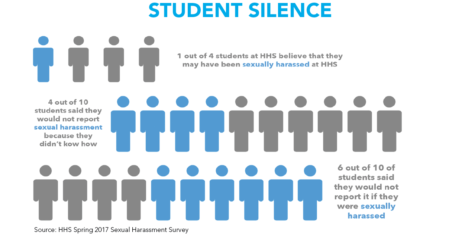Social media community rallies around #MeToo, showing solidarity with sexual assault victims
Nov 1, 2017
In the wake of revelations of sexual harassment and assault throughout Hollywood, people across the world are stepping out and sharing stories of survival and perseverance using the hashtag “Me Too.”
According to the Washington Post, the movement began over a decade ago. Tarana Burke, sexual assault survivor, wanted to take action to help girls and women, particularly of color, who had also survived sexual violence. The campaign recently went viral when Hollywood stars finally broke their silence regarding sexual misconduct involving producer Harvey Weinstein.
“It made my heart swell to see women using this idea — one that we call ‘empowerment through empathy,’” Burke tweeted. “To not only show the world how widespread and pervasive sexual violence is, but also to let other survivors know they are not alone. #metoo.”
The awareness campaign has inspired millions of posts on Twitter and Facebook and is continuing to grow and spread to new audiences. According to the Washington Post, the campaign has helped to redirect a conversation about one man toward one about the women who have survived sexual harassment or sexual assault.
Sexual violence has long been considered a “taboo” topic. Victims of misconduct, both men and women, have been encouraged to cover up abuse for so long and were denied the justice they so desperately deserved.
This movement is not only empowering people, women in particular, to share stories of strength and survival, but it is advocating for the importance of support and bringing people together through recognition and healing.
The campaign is continuously creating hope and inspiration, according to Burke, and will continue to make an impact, as sexual harassment is finally being recognized as a “serious problem” in society.
According to a Washington Post-ABC News poll, the number of Americans who recognize sexual harassment in the workplace as a serious problem has risen from 47 percent in 2011 to 64 percent in 2017.
Now is the time for people to speak out and take action against this ongoing act of violence. One area in which we can help to spread the word and prevent the occurrence of sexual misconduct is on college campuses.
According to the New York Times, on Friday, Sept. 22, Education Secretary Betsy DeVos scrapped Obama-era policy on campus sexual assault investigations. In particular, the reversal of the portion which demanded colleges to use a preponderance of evidence, or the lowest standard of proof, has allegedly restored a “basic element of fairness” to the accused.
This ultimately brings into question the role of the accused in the criminal act and downplays the seriousness of the issue of campus safety. Shouldn’t there be one universal standard in which campuses are required to comply in order to reassure the safety and well-being of students, no matter their identification or background?
Although sexual harassment and assault occurs on both sides of the spectrum, historically, women have been more likely to be the victims of the criminal act. With that being said, it’s time for men to step up and take a stance against sexual misconduct, which is beginning to take form through the “how I will change” movement.
The hashtag, started by Australian author and journalist Benjamin Law, is a response to the viral “me too” movement and encourages men to address the controversy regarding sexual abuse and suggests ways in which men can reverse their role in today’s society.
By expanding the movement against sexual violence to include everyone across the spectrum, we are able to raise even more awareness for an issue which affects millions of men and women around the world. It is our role as humans and witnesses of this injustice to shed light on this issue and provide victims with the resources and platforms they need in order to receive help.
“If you are a survivor who is feeling activated by this, there are organizations across the country that are doing this. Small organizations, local organizations,” Burke said. “If you’re compelled to do a thing, just do something.”
The Washington Post suggests ways in which people can get involved, including getting trained to volunteer on a sexual violence hotline and donating to a charity that supports survivors.
